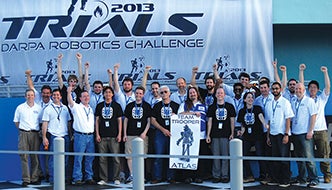In December, Team TROOPER completed the Defense Advanced Research Projects Agency (DARPA) Robotics Challenge trials at the Homestead-Miami Speedway. The Lockheed Martin Advanced Technology Laboratories-led team, which also includes Rensselaer and the University of Pennsylvania, guided an Atlas humanoid robot through a number of tasks designed to simulate disaster response scenarios.

Rensselaer was represented by five members on Team TROOPER, including Professor Jeff Trinkle (back row, center), who has been tapped to lead the National Robotics Initiative.
The team is one of eight to move forward onto the next phase of the Challenge. In 2014, the team will continue to refine and expand its robotic system concept in preparation for the DARPA Robotics Challenge finals. The final winner will receive a $2 million prize.
As a top qualifier in DARPA’s Virtual Robotics Challenge held earlier this year, Team TROOPER received an Atlas robot to combine with advanced control algorithms and an operator station. The team developed a conceptual system and programmed Atlas to perform a series of disaster relief tasks. Tasks included driving a vehicle, walking over various hazards, climbing a ladder, walking over debris, opening doors, drilling a shape in a cement wall, closing various valves, and attaching a hose to a hydrant.

Team TROOPER’s Atlas robot was guided by its human counterparts from Rensselaer, Lockheed Martin, and University of Pennsylvania.
“I am thrilled with the success of Team TROOPER and proud to have participated,” said Jeff Trinkle, professor of computer science and director of the Rensselaer Computer Science Department Robotics Lab.
“I think the Challenge is especially important, because it showed the public that robots will be able to do a lot more than work in factories and vacuum floors,” Trinkle said. “At the same time, it showed how far we still have to go—taking 10 or 15 minutes to open a door is way too long! The Challenge also provided the perfect opportunity to put basic research to the test. If the Challenge is repeated in the future, I am sure that robots will be able to help in dangerous situations much more than anyone would have thought.”
Trinkle, along with doctoral students Jun Dong, Shuai Li, and Jedediyah Williams, and postdoctoral researcher and visiting scholar Daniel Montrallo Flickinger, are members of the TROOPER team. Flickinger, who is the principal liaison between Rensselaer and the other TROOPER partners, had “a great view of all the events, since I was on the field team for every single one of them,” he said.
“This was a very challenging project, and the team performed amazingly well considering the short time frame,” he said. “The team was strong on the valve and door tasks, and also did pretty well on the ladder task. It’s awesome that we get to go on to the finals, and I’m already lining up the plans for my work over the next several months. We have a lot of work to do this year, and I’m optimistic with what we’re going to see at the finals from Team TROOPER and the rest of the teams.”


